If you’re searching for the best VPN for Nepal in 2025, you’re likely weighing two things: reliable access on mobile networks and clear guidance on what’s legal and practical right now. Recent platform restrictions and protests have made connectivity unpredictable, while cafés, hotels, and public Wi-Fi add security risks.
This guide keeps things simple and neutral: what features matter for Nepal, whether VPNs are legal, which apps have faced bans, and which services actually work well on iPhone and Android. You’ll also learn how to get a Nepali or nearby IP address and what to expect from free vs. paid options.
Is a VPN Legal in Nepal? What the Recent Bans Change (and Don’t)
Recent blocks on dozens of social platforms triggered huge demonstrations and then a quick policy reversal, so it’s fair to ask what a VPN can and can’t do. In short, using a VPN is legal in Nepal, but illegal activity remains illegal, and service availability can change as rules evolve. Treat a VPN as a privacy and connectivity tool—not a guarantee that every platform will load.
Context you should know: Authorities temporarily blocked major platforms (e.g., Facebook, Instagram, YouTube, X), leading to fatal clashes; the government has since lifted the ban, but the policy environment remains fluid. Expect periodic access changes and plan for alternatives.
What to Look For in a Nepal-Ready VPN (Mobile-First)
You’ll mostly use a VPN on iOS or Android, often on crowded Wi-Fi or cellular networks. The right pick balances nearby servers for low latency, mobile stability, and strong privacy. Before comparing brands, align on the criteria below—these are the same factors reviewers and testers emphasize for Nepal in 2025.
- Nearby or in-country servers: Nepal or neighboring routes (India, Thailand, etc.), lower ping, and improved reliability on mobile.
- Proven privacy: Transparent no-logs claims with recent third-party audits.
- Stability on mobile: Quick reconnects, kill switch, and leak protection for spotty café/hotel Wi-Fi.
- Obfuscation/stealth: Helps connections on over-zealous networks.
- Straightforward apps: Clean iOS/Android UX, minimal friction to connect.
Best VPNs for Nepal (Tested on Mobile Networks)
If you’re on iOS or Android in Nepal, begin with providers known for stable apps and nearby nodes. Results vary by network and time of day, and policies can shift; treat these as reliable starting points and rotate regions when an app struggles.
BearVPN — No-Registration Light Choice, Quick Start
If your only goal is simple, on-phone privacy and a quick way to try nearby routes, a lightweight mobile VPN can be the right fit. BearVPN is currently available on iOS and Android (desktop “coming soon”) with a free tier, no registration requirement on mobile, and a published network of 1,000+ servers in 50+ locations. It’s a pragmatic, low-friction choice if you want to secure café Wi-Fi and test “nearest” connections first.
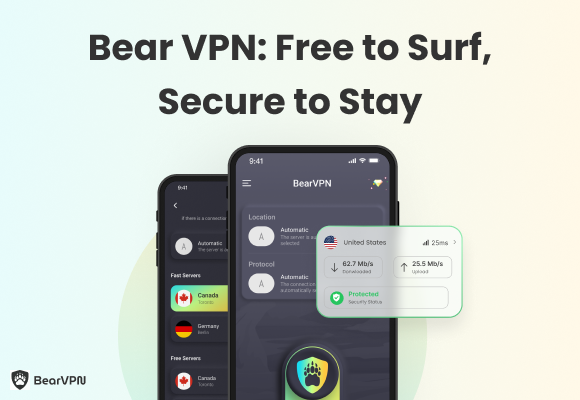
Key Features
- iOS & Android apps (mobile-only at present)
- Free plan (with optional Premium)
- AES-256 encryption, stated a no-logs policy
- “No registration required” on mobile; quick connect flow
Pros
- Extremely easy to get started on a phone
- Low barrier to test nearby routes for latency
- Clear, simple onboarding
Cons
- No desktop apps yet
- Fewer advanced privacy options than the top paid suites
- Free tier performance can vary at peak times
ExpressVPN — Fast, Beginner-Friendly, and Widely Audited
ExpressVPN is consistently rated for excellent speeds, an easy app experience, and rigorous third-party audits of its RAM-only TrustedServer technology. It lists Nepal among its server locations and maintains a very broad global network, which helps when you need to pivot between nearby routes. It’s premium-priced, but the polish and track record appeal to many mobile users.
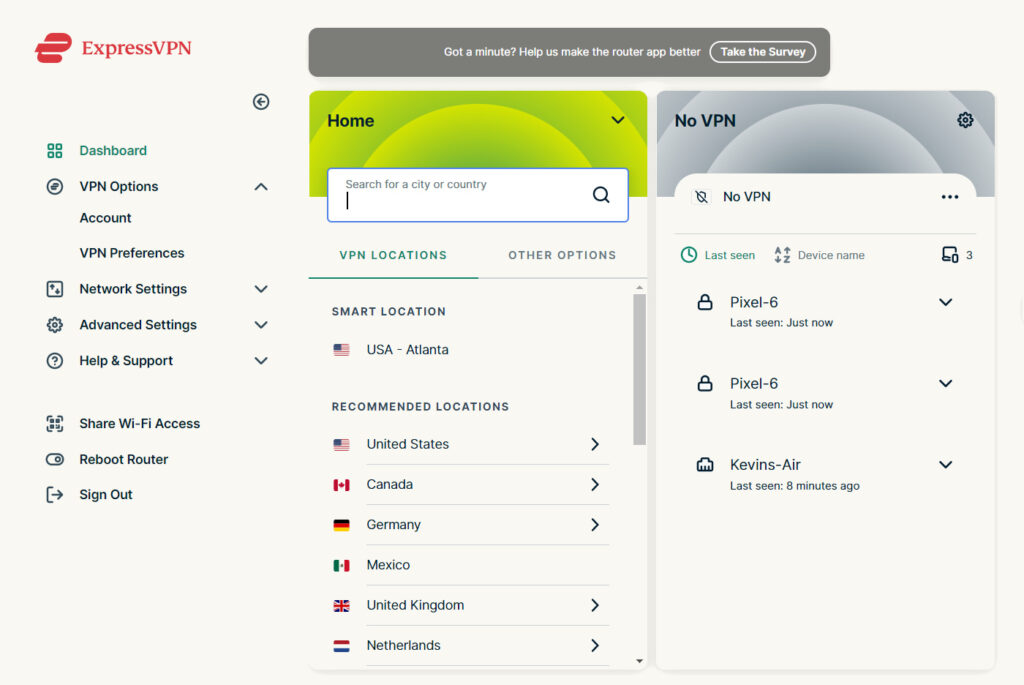
Key Features
- RAM-only server design (TrustedServer), Lightway protocol
- Wide coverage (≈105–106 countries), including Nepal
- Split tunneling, kill switch, leak protection
- Frequent independent audits
Pros
- Fast, reliable connections for streaming and browsing
- Very simple iOS/Android apps
- Strong privacy posture with repeated audits
Cons
- Higher cost than most competitors
- Fewer deep-tweak options for power users
NordVPN — Strong Security Stack with Nepal Location Options
NordVPN combines speed with an extensive toolset (Threat Protection, Meshnet) and operates RAM-based servers. Its official server pages list Nepal, and the service regularly publishes no-logs assurance engagements. On mobile, it’s a good blend of performance and security features, with obfuscated servers if networks get finicky.
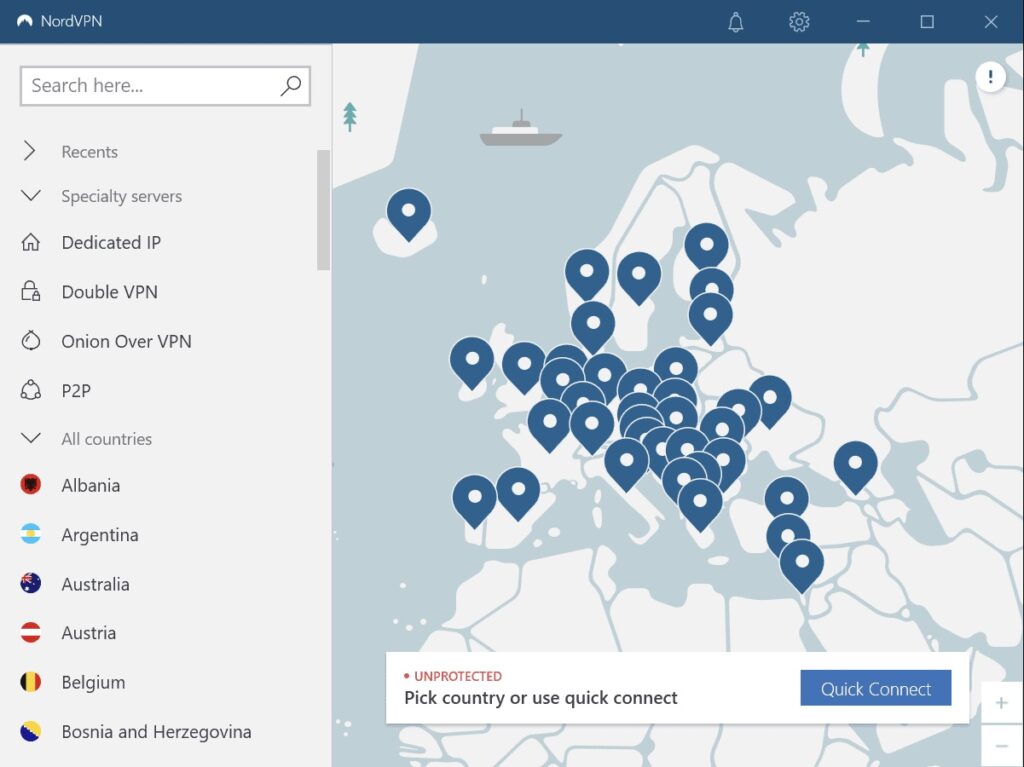
Key Features
- RAM-based server architecture
- Obfuscated servers, Double VPN options
- Recent independent no-logs assessments
- Broad nearby coverage for low latency
Pros
- Excellent speeds on modern protocols
- Robust security extras for travelers
- Wide ecosystem beyond the core VPN
Cons
- App has more toggles—can feel complex at first
- Some specialty features aren’t needed for casual users
Proton VPN — Privacy-First with Reported Nepal Servers
Proton VPN emphasizes transparency (open-source apps, audits) and publishes a live server list that includes Nepal. Mobile apps are clean and reliable, with profiles and quick-connect for the nearest routes. Free tier is well-known, but streaming and some features are paywalled; paid plans are better for consistent speeds.
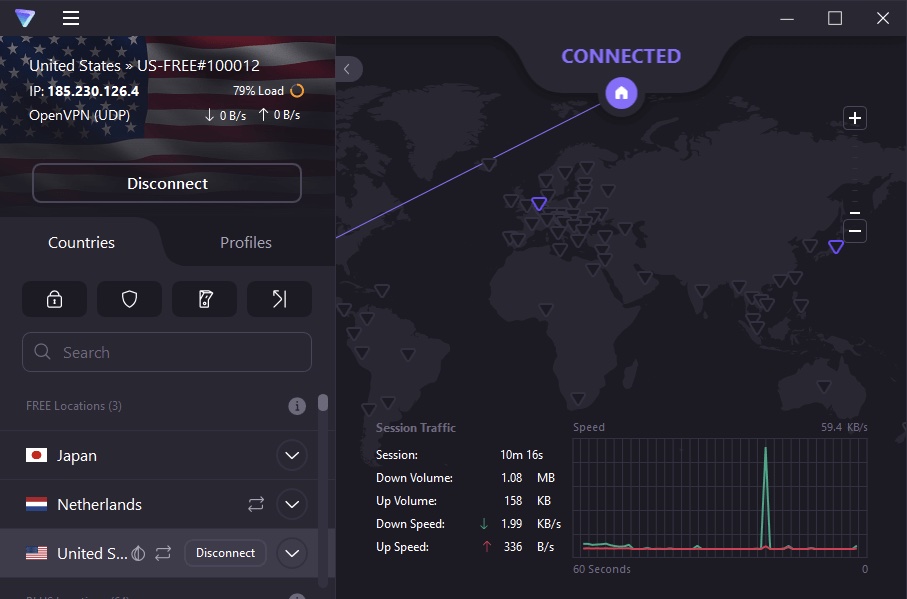
Key Features
- Audited no-logs policy, open-source clients
- Secure Core (multi-hop) options
- Server list shows Nepal + multiple nearby countries
- Useful quick-connect and profiles on mobile
Pros
- Strong privacy posture and transparency
- Good performance on paid tiers
- Clear server selection (including Nepal)
Cons
- Free plan limits throughput/streaming
- Power features can raise the price
Surfshark — Great Value, Unlimited Devices, and RAM-Only Network
Surfshark is a value leader: fast in many independent tests, unlimited devices, and a fully RAM-only network. It provides a Nepal location page and ample nearby routes, which is helpful when latency matters. On mobile, CleanWeb (blockers) and split tunneling are handy, though renewal pricing can jump.
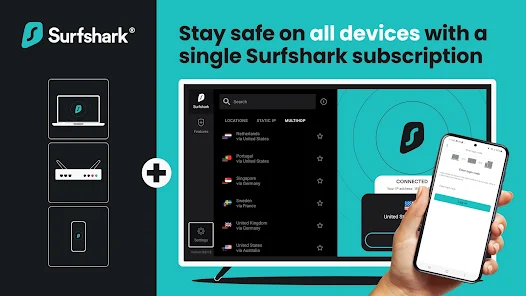
Key Features
- RAM-only servers across the fleet
- Unlimited simultaneous connections
- Split tunneling, CleanWeb filtering
- Broad global coverage with the Nepal page
Pros
- Excellent performance-to-price ratio
- Handy extras for daily mobile use
- Works across many platforms
Cons
- Renewal prices can be steep
- Security extras aren’t a full antivirus replacement
Apps Banned in Nepal (2025 Update): What Was on the Lists
Lists circulated with 26 blocked apps, including Facebook, Instagram, WhatsApp, YouTube, X, LinkedIn, Snapchat, Reddit, Discord, Pinterest, Signal, Threads, WeChat, Quora, Tumblr, Clubhouse, Mastodon, Rumble, VK, Line, IMO, Zalo, Soul, Hamro Patro, and BeReal (some items varied by source). Later reporting noted exceptions/registrations for Viber and TikTok. The ban has been lifted, but status can change—always check current local guidance.
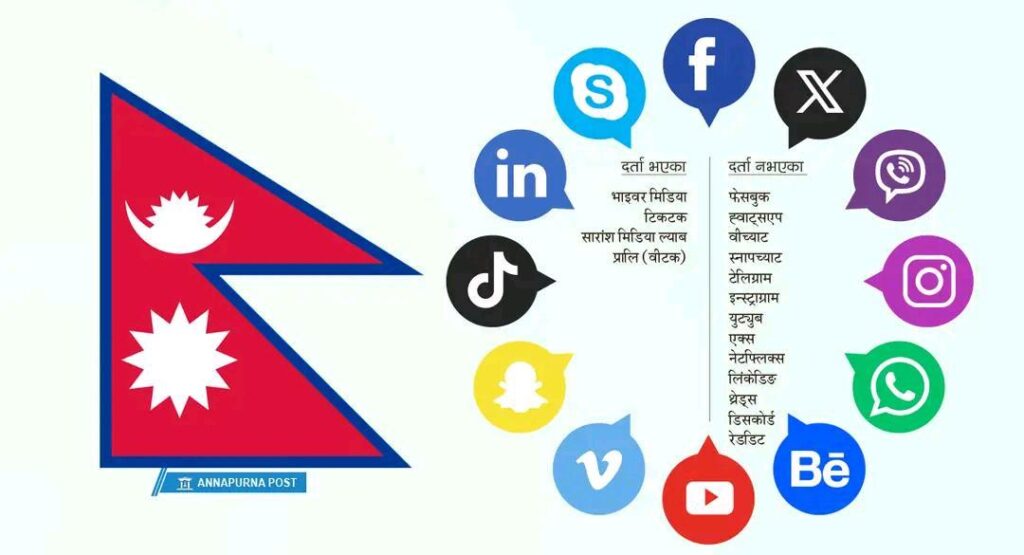
How to Get a Nepali (or Nearby) IP Address Safely
You don’t always need a Nepali server—often a nearby route offers the best mix of speed and stability for messaging and browsing. If you do need a Nepali IP for local TV or banking, pick a provider that explicitly lists Nepal and follow these steps: connect, verify your IP, and test the target app before assuming it works long-term. Clear caches and avoid chaining proxies.
Practical steps:
- Connect to Nepal or the nearest location first.
- Run an IP-check tool and basic speed test.
- Try the app/site you need.
- If unstable, switch to another nearby server (e.g., India or Thailand).
- Don’t stack VPN + proxy + DNS tricks unless you’re debugging—latency and failure rates spike.
Streaming, Messaging & Banking: What Works—and What Doesn’t
Service behavior differs. Streaming catalogs vary by region and may block some VPN endpoints; messaging apps can change policies quickly; banking apps might flag unusual IPs when you travel. Keep expectations realistic: start with the closest route for the lowest ping and change regions only when necessary. If an app asks you to disable VPN for login, follow the prompt, then re-enable if allowed.
Free vs. Paid on Mobile (Limits, Logs, Battery, Data Caps)
Free VPNs can be useful in a pinch, but you’ll often see lower speeds at peak times, fewer locations, and stricter data caps. Paid plans typically deliver steadier throughput, stronger obfuscation, and better privacy assurances backed by audits. On phones, weigh background battery impact and consider split-tunneling to keep only sensitive apps on the VPN when performance matters.
Quick FAQs for Nepal Users
1. Is using a VPN legal in Nepal?
Yes—VPNs are legal; unlawful activity remains unlawful. Policies around platforms may change, so always use VPNs responsibly and within local laws.
2. Does a VPN change my GPS location?
No. A VPN alters your IP route, not your device’s GPS. Location permissions and device settings still control GPS.
3. Why does “nearest location” often work best?
Shorter distance usually means lower latency and fewer drops, especially on congested Wi-Fi or mobile networks.
4. Can any VPN guarantee access to every app?
No. Availability can change based on policy shifts and platform countermeasures. Treat VPNs as tools—not magic keys.
Conclusion
What is the best VPN for Nepal depends on your priority: simplicity on iPhone/Android, privacy assurances, or consistent speed on nearby routes. ExpressVPN and NordVPN bring premium polish and audits, Proton VPN stresses transparency with in-country listings, and Surfshark delivers strong value with unlimited devices. If you just need a quick, mobile-only option, BearVPN offers a fast start on iOS and Android. Whatever you choose, connect to the nearest viable location, test first, and expect conditions to evolve. That mindset—plus good security hygiene—will keep you private and productive on Nepal’s networks.



